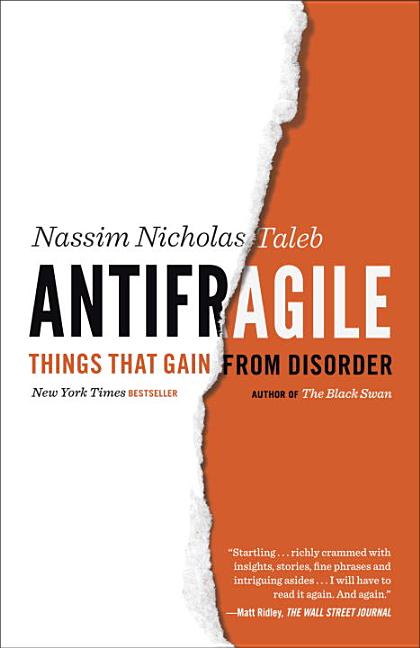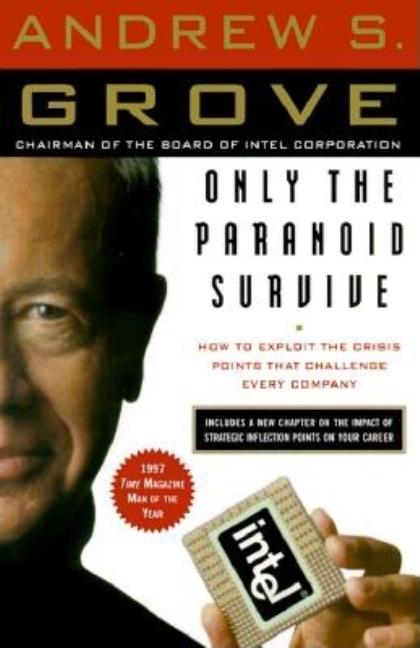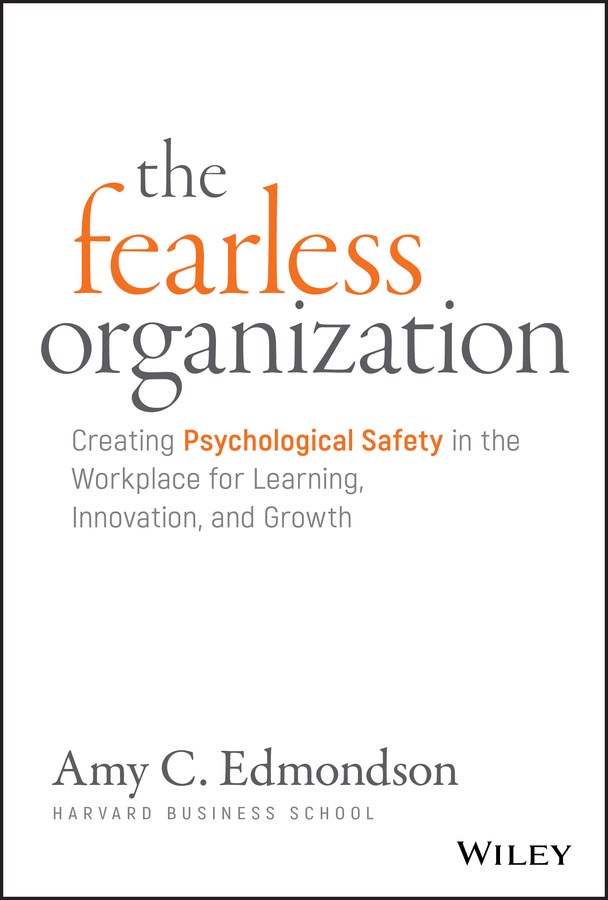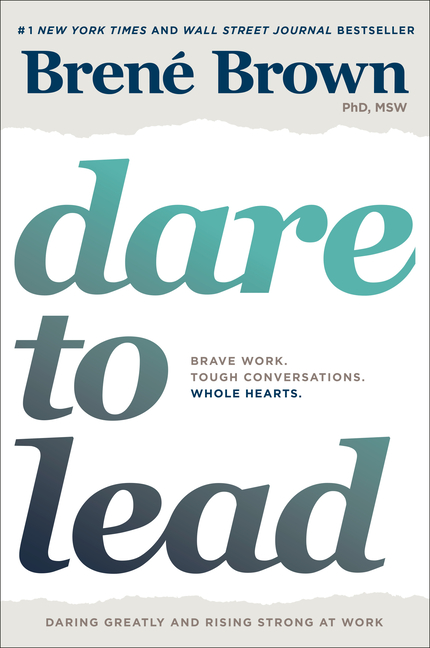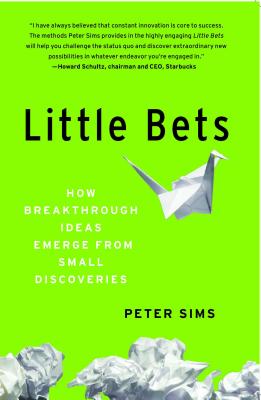Five Books for a Crisis
May 08, 2020
Our Managing Director Sally Haldorson looks at five books that she has found insightful over the years that are relevant to the times we're in and how we might get through them.
In trying times, we naturally reach back to the past to help us understand the context of what has happened/is happening. (Note the many articles and podcasts about the 1918 Spanish flu that have surfaced recently to help us grasp the possible impact of COVID-19.) At Porchlight, we’ve been through a lot of ups and downs, using our creativity and gumption to pivot when the way forward becomes blocked by competition or constraint. And we’ve also relied on the wisdom found in the books we recommend and sell to guide us in a new direction. These are some of the books that I have found insightful over the years that I hope can help bring you some understanding and some inspiration, as well.
In 2007, Nassim Nicolas Taleb wrote The Black Swan and introduced the concept of a non-avian “black swan” into common parlance. Defined as “a highly improbable event with three principal characteristics: It is unpredictable; it carries a massive impact; and, after the fact, we concoct an explanation that makes it appear less random and more predictable than it was,” it’s easy to see how the COVID-19 could be considered an example. (Taleb himself says that pandemic was predictable, by himself nonetheless, and thus not a black swan.)
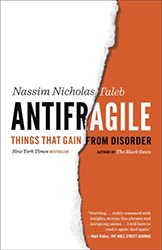 As notable a book as The Black Swan is, I find Taleb’s Antifragile: Things That Gain from Disorder the book I’m thinking about these days. Back in 2012, I reviewed the book, concluding: “It's a great trip landing on Nassim Nicholas Taleb's planet, a planet displaying such big and rangy ideas, a topographical map could be constructed as a model for the snaking rivers, the breath-robbing mountains, and the dusty valleys, of his knowledge.” In the opening section titled, "How to Love the Wind," Taleb compares our desire for stability to a candle. A candle’s flame needs to be protected from the wind, but a fire uses the wind to fan its flames and grow stronger. “Likewise with randomness, uncertainty, chaos: you want to use them, not hide from them. You want to be the fire and wish for the wind.” Right now, in the midst of the pandemic, it makes sense to be the candle, to protect ourselves and our loved ones in the face of staggering risk. But if we are to come out the other side of this challenge, we must embrace the volatility in order "to live in a world that does not want us to understand it, a world whose charm comes from our inability to truly understand it."
As notable a book as The Black Swan is, I find Taleb’s Antifragile: Things That Gain from Disorder the book I’m thinking about these days. Back in 2012, I reviewed the book, concluding: “It's a great trip landing on Nassim Nicholas Taleb's planet, a planet displaying such big and rangy ideas, a topographical map could be constructed as a model for the snaking rivers, the breath-robbing mountains, and the dusty valleys, of his knowledge.” In the opening section titled, "How to Love the Wind," Taleb compares our desire for stability to a candle. A candle’s flame needs to be protected from the wind, but a fire uses the wind to fan its flames and grow stronger. “Likewise with randomness, uncertainty, chaos: you want to use them, not hide from them. You want to be the fire and wish for the wind.” Right now, in the midst of the pandemic, it makes sense to be the candle, to protect ourselves and our loved ones in the face of staggering risk. But if we are to come out the other side of this challenge, we must embrace the volatility in order "to live in a world that does not want us to understand it, a world whose charm comes from our inability to truly understand it."
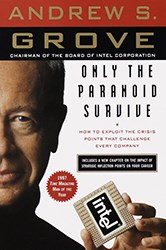 Over 30 years ago, Andy Grove wrote the business classic, Only the Paranoid Survive. Many consider Andy Grove—who built Intel, one of the greatest tech companies in the history of Silicon Valley—to be one of the best managers in the history of business. In our book, The 100 Best Business Books of All Time, we included Only the Paranoid Survive and our review focused on Grove’s instructions for identifying an SIP (strategic inflection point)—or rather, identifying those times when the economy or your industry has changed so that you can make quick decisions rather than be surprised and paralyzed when they happen. In our current circumstances, business leaders are being asked to make decisions based on very little data and likely no experience in such situations. The pressure to get it right is overwhelming. “Managing, especially managing through a crisis, is an extremely personal affair.” But Grove’s timeless methods are welcome guideposts to lead us out of these uncertain times.
Over 30 years ago, Andy Grove wrote the business classic, Only the Paranoid Survive. Many consider Andy Grove—who built Intel, one of the greatest tech companies in the history of Silicon Valley—to be one of the best managers in the history of business. In our book, The 100 Best Business Books of All Time, we included Only the Paranoid Survive and our review focused on Grove’s instructions for identifying an SIP (strategic inflection point)—or rather, identifying those times when the economy or your industry has changed so that you can make quick decisions rather than be surprised and paralyzed when they happen. In our current circumstances, business leaders are being asked to make decisions based on very little data and likely no experience in such situations. The pressure to get it right is overwhelming. “Managing, especially managing through a crisis, is an extremely personal affair.” But Grove’s timeless methods are welcome guideposts to lead us out of these uncertain times.
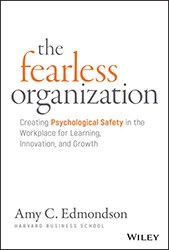 Ok, I get it: everyone is afraid right now. Leaders, the securely employed, and the unemployed—everyone is reeling from the impact COVID-19 has had and continues to have on our lives and our organizations. So recommending a book like The Fearless Organization: Creating Psychological Safety in the Workplace for Learning, Innovation, and Growth by Amy C. Edmondson might seem a bit of an oxymoron. But now is exactly the time to be aware of how undermining fear is to the health of an organization, and, starting today, how much we all need to prioritize trust. How do you do that when you have or may have to furlough or layoff employees? How do you do that when you don’t know if your business will exist after next month or into next year? You start as you would at any other time, but now it’s because your organization’s future depends on the free sharing of ideas and transparency. You start at being willing to share the hard truths. Show your trust in your people by telling them what you know and what you don’t. And don’t be afraid to ask for help… or understanding. If you trust your people, your people will trust you. When the economy is back on course, prioritizing psychology safety will give you and your people a stable center of trust for when the next black swan or SIP appears.
Ok, I get it: everyone is afraid right now. Leaders, the securely employed, and the unemployed—everyone is reeling from the impact COVID-19 has had and continues to have on our lives and our organizations. So recommending a book like The Fearless Organization: Creating Psychological Safety in the Workplace for Learning, Innovation, and Growth by Amy C. Edmondson might seem a bit of an oxymoron. But now is exactly the time to be aware of how undermining fear is to the health of an organization, and, starting today, how much we all need to prioritize trust. How do you do that when you have or may have to furlough or layoff employees? How do you do that when you don’t know if your business will exist after next month or into next year? You start as you would at any other time, but now it’s because your organization’s future depends on the free sharing of ideas and transparency. You start at being willing to share the hard truths. Show your trust in your people by telling them what you know and what you don’t. And don’t be afraid to ask for help… or understanding. If you trust your people, your people will trust you. When the economy is back on course, prioritizing psychology safety will give you and your people a stable center of trust for when the next black swan or SIP appears.
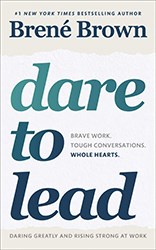 COVID-19 has us all on our heels. It’s doubtful that anyone goes to bed at night these days confident that tomorrow will suddenly make sense. That means… we’re all feeling very, very vulnerable. And that means Brene Brown’s Dare to Lead is the book we all need to take to bed with us each night before we fall asleep. In it, Brown reassures us that we can use our current state of vulnerability to be better leaders for our staff, better coworkers to one another, better family members to those we now spend a lot more time with every day. You don’t need to be a hero; you just need to be human. “It turns out that trust is in fact earned in the smallest of moments. It is earned not through heroic deeds, or even highly visible actions, but through paying attention, listening, and gestures of genuine care and connection.” While Brown defines leaders as people who find and develop the potential in others, more importantly she believes that leaders themselves have endless potential—potential to change, to improve, to be more self-aware, to be more open, to be more courageous. This crisis might just be the inflection point that pushes each of us into “the arena” Brown calls life, and demands we meet our potential to be the kind of leader who can be the emotional North Star to everyone who is in need of guidance, just as Brown is to us.
COVID-19 has us all on our heels. It’s doubtful that anyone goes to bed at night these days confident that tomorrow will suddenly make sense. That means… we’re all feeling very, very vulnerable. And that means Brene Brown’s Dare to Lead is the book we all need to take to bed with us each night before we fall asleep. In it, Brown reassures us that we can use our current state of vulnerability to be better leaders for our staff, better coworkers to one another, better family members to those we now spend a lot more time with every day. You don’t need to be a hero; you just need to be human. “It turns out that trust is in fact earned in the smallest of moments. It is earned not through heroic deeds, or even highly visible actions, but through paying attention, listening, and gestures of genuine care and connection.” While Brown defines leaders as people who find and develop the potential in others, more importantly she believes that leaders themselves have endless potential—potential to change, to improve, to be more self-aware, to be more open, to be more courageous. This crisis might just be the inflection point that pushes each of us into “the arena” Brown calls life, and demands we meet our potential to be the kind of leader who can be the emotional North Star to everyone who is in need of guidance, just as Brown is to us.
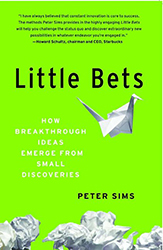 But what should we do next? It’s one thing to improve our facility with change and our degree of emotional intelligence, but how do we improve our bottomed-out businesses when it seems all of the regular rules have flown out the window? There are any number of articles and webcasts online that trumpet the “pivot.” Instead of marching straight ahead toward market share and profit on the back of our tried-and-true business model, lean times force us to get creative. If your marketing budget has been slashed, if your sales travel has been curtailed, if your staff has been let go, how on earth can you pivot? With small steps and incremental ideas, says Peter Sims in his 2011 book, Little Bets: How Breakthrough Ideas Emerge from Small Discoveries. Sims explains that little bets lead to small wins and, “Small wins are like footholds or building blocks amid the inevitable uncertainty of moving forward.” And what we most certainly need right now is a way forward despite the uncertainty. Even in the best of times, Sims cautions, it’s nearly impossible to predict the future, so plotting out careful plans and forecasting results often leads to disappointment. Now, when we don’t have any idea how 2020 will play out, when we are constrained by COVID-19 and forced to rethink our business strategy, it’s the perfect time to plant a few seeds now and see just how big those ideas can grow.
But what should we do next? It’s one thing to improve our facility with change and our degree of emotional intelligence, but how do we improve our bottomed-out businesses when it seems all of the regular rules have flown out the window? There are any number of articles and webcasts online that trumpet the “pivot.” Instead of marching straight ahead toward market share and profit on the back of our tried-and-true business model, lean times force us to get creative. If your marketing budget has been slashed, if your sales travel has been curtailed, if your staff has been let go, how on earth can you pivot? With small steps and incremental ideas, says Peter Sims in his 2011 book, Little Bets: How Breakthrough Ideas Emerge from Small Discoveries. Sims explains that little bets lead to small wins and, “Small wins are like footholds or building blocks amid the inevitable uncertainty of moving forward.” And what we most certainly need right now is a way forward despite the uncertainty. Even in the best of times, Sims cautions, it’s nearly impossible to predict the future, so plotting out careful plans and forecasting results often leads to disappointment. Now, when we don’t have any idea how 2020 will play out, when we are constrained by COVID-19 and forced to rethink our business strategy, it’s the perfect time to plant a few seeds now and see just how big those ideas can grow.



